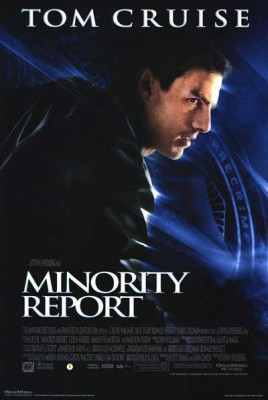 Directed by Steven Spielberg
Directed by Steven Spielberg
Written by Scott Frank, Jon Cohen [based on Minority Report by Philip K. Dick]
Starring Tom Cruise, Colin Farrell, Samantha Morton, Max von Sydow
Getting a good cast and crew for a movie is obviously essential when producing something of worth, but coupling that with a timeless plot conceived by one of the world’s top science fiction writers is guaranteed to inspire a masterpiece. I don’t think I could be accused of sensationalising here when I say that Minority Report is one of the most impressive science fiction films of all time, and certainly one of the best dystopian films.
Cruise plays John Anderton, the captain of the fledgling Precrime division of the police force. It is Anderton’s task, with the help of three mutant humans with precognitive abilities (Precogs) to discover violent crimes and intercept them before they are committed. With a mixture of advanced science and unknown psychic abilities held by the Precogs, Anderton and his team intercept and imprison those with the intention of committing heinous crimes on innocent people. Anderton is passionate and determined to rid the nation of murder, his continuous incentive being the unsolved murder of his own son.
As Precrime is in its infancy, the United States Justice Department sends a representative in the form of Danny Witwer (Farrell) to carry out an investigation into the process. During Witwer’s strict and inconvenient questioning, Anderton is informed of the future murder of a man named Leo Crow by the Precogs – and he is the suspect. Anderton believes he is somehow being set up by Witwer who wants to highlight false problems with the Precrime process, but when he discovers that the Precogs are not always exact with their predictions he begins to doubt his work. The Precogs occasionally experience alternate visions of the future and these Minority Reports are then hidden, the whole department having been unknowingly imprisoning potentially innocent people and covering up a incredibly damaging conspiracy. But who is behind the secrecy of the Minority Reports, and why are they hidden? Why has Anderton been set up when he knew nothing of the conspiracy initially, and who is Leo Crow?
This film is a perfect balance between sturdy, intriguing science fiction and great Hollywood action movie. The overall look of it is impressively seamless even after more than a decade since its creation, but it is the minor details and subtle features of it that continue to impress and intrigue me. Although set in the future, the set designs are not entirely unrecognisable to the present day and, unlike most dystopian films, not everything is oppressively clean and sterile. Anderton’s apartment for instance is cluttered and messy and old slums are a part of the newer architecture of the city. The inventions presented in the film made practical sense and were not pointlessly flashy, such as the computers controlled by hand movements, and the costumes would not look out of place today. Something that I absolutely adored were the jet packs that seemed difficult to control and the brilliant Sick Sticks – two small additions that added a great amount of charm.
I was reminded of a lot of various science fiction throughout this movie. Gattaca would sit very comfortably alongside Minority Report in an essay on predetermined inevitability and the power of choosing one’s own destiny, and A Clockwork Orange also contains many of the same themes including crime and its integral position within a society. In the scene where Anderton undergoes an eye transplant operation for example, one immediately envisions a mirroring moment from Kubrick’s 1971 dystopic horror. It seems as though we are fascinated with the idea of a world where there is no crime or hostility, but it’s unfortunately this sort of diversity amongst people that makes us human. Without negativity there is theoretically no positivity, and this is a subject matter that will always remain relevant in fiction.
The tone of Minority Report clearly pushed the right buttons for its audience but I felt that the pacing and the schmaltzy ending retracted from the otherwise clever observations and fascinating questioning of archaic morals. It’s heartbreaking to witness an almost perfect film damaged by the Americanised mentality that everything has to have a happy ending, and the poorly paced plot reveals really deflated me by the end. It seems as though Spielberg put his all into the first two-thirds of the film and then retreated with his old favourite ‘everything-will-be-okay-in-the-end’ type conclusion. This may have been passable for films such as Jurassic Park but dystopian fiction calls for something a little more robust than that.
Despite the syrupy ending, Minority Report will undoubtedly be remembered as a game-altering classic. The film has not only raised the bar for other science fiction but has also inspired the invention of revolutionary technology. All of this combined with strong, ambiguous moral dilemmas in my mind makes for a brilliant dystopian movie. It confidently encompasses philosophy, technology and spirituality in a way that most have avoided or failed at…a perfect example of what good film-making can be.



Leave a Reply